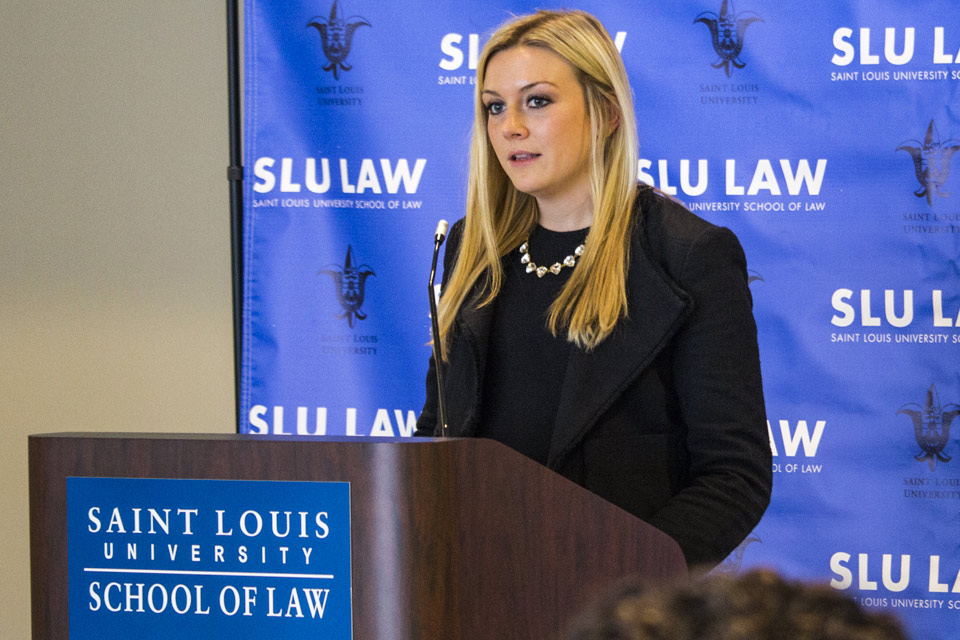Schools of Law and Medicine Team Up to Eradicate Hepatitis C in Missouri
“Missouri is a giant leap closer to curing all of its citizens of hepatitis C,” announced third-year law student Lizzie Kurowski at a press conference Tuesday, Nov. 21, at the School of Law.
“Years of pain and fatigue will end in just eight short weeks of treatment with the drugs available that completely cure hepatitis C, a serious and communicable disease.”
Kurowski was part of a legal team that filed a federal lawsuit on behalf of three individuals on Medicaid against the Missouri Department of Social Services in October 2016. The team was led by Saint Louis University Legal Clinics; John Ammann, J.D., McDonnell Professor of Justice in American Society; Legal Services of Eastern Missouri; and the National Health Law Program.
The lawsuit challenged the state’s Medicaid policy, which restricted the coverage of these life-saving drugs to only patients with the most advanced stages of the disease, despite other patients’ risk of impending liver disease or cancer.
The team also included Bruce Bacon, M.D., co-director of the Saint Louis University Liver Center in the Division of Hepatology at Saint Louis University School of Medicine, who along with his staff advocated for low-income Missourians with hepatitis C.
“The state’s rationale was they had a limited resource and would only treat the patients who really needed it, not all the patients,” Bacon said. “The problem was that it became readily apparent that it was cost-effective to treat patients before they got really sick and eradicate the virus, not wait until they got really sick and then treat them.”
“Providing the early treatment will save money by reducing the need for more expensive long-term treatment, including transplants,” Ammann added. “Medicaid was covering liver transplants at $300,000 to $400,000, but not paying for the medication that would cure the disease [before significant liver damage].”
Besides the long-term economic benefit to the state following the change in policy, Ammann noted the moral problem of not providing the existing cure – which has been covered by most major health insurers for years – to the state’s most vulnerable residents, as well as the public health risk of not stopping the spread of a curable disease.
“During the past year of litigation and before, there were poor people in Missouri who suffered needlessly. Patients would come to Dr. Bacon, and he knew the drugs were available, but they wouldn’t be covered by Medicaid,” Ammann said.
“It’s also important to note that there’s a racial disparity in health law in America, and that’s true with hepatitis C. African Americans are twice as likely to be living with hep C compared with the general population. Chronic liver disease, which comes from hep C, is one of the leading causes of death for African Americans between the ages of 45 and 64. So this is an important step in eliminating at least one of the disparities in health care in the U.S. because everyone is cured.”
Bacon estimated that the policy change will affect approximately 100,000 people in Missouri, and that while about half the states still limit access to the medication, Missouri’s policy change will continue the national momentum to eventually eliminate the disease across the country.
“These cures are dramatic in terms of the improvement of quality of life that patients have,” he said. “Patients feel so much better after they no longer have the virus. Additionally, the public health improvements from eradicating this virus are tremendous. We know that hepatitis C can be transmitted from mother to child in childbirth. We know that the incidence of hepatitis C is actually increasing in our society and is linked to the opioid epidemic going on in the U.S. So it’s an important time for us for those of us who take care of patients with liver disease and specifically hepatitis C.
"We feel very confident that we can get to a point where we will be able to literally cure everybody and eliminate this virus from infecting and affecting any patients in the U.S. at all.”
Over the past year, several law students in the Legal Clinics have been involved in the lawsuit, working with the clients, interviewing patients, developing affidavits, going to clients’ homes to prepare them for having their depositions taken. Kurowski got involved this semester with researching and contacting other advocates to help with the case, as well.
“I wanted more knowledge of the medical aspects of the case,” she said. “Having diabetes myself, I was interested in learning more to incorporate into my law practice. My research included ensuring the state was ending the case when they said they were going to and making sure that the drugs being covered will stay covered.”
Other partners in the lawsuit included Joel Ferber and Jamie Rodriguez (Law ’10) of Legal Services of Eastern Missouri; Jane Perkins and Abbi Coursolle of the National Health Law Program; Washington University physician Jaquelyn Fleckenstein, M.D.; and Kansas City CARE Clinic physician Blair A. Thedinger, M.D.
Saint Louis University School of Law was founded in 1843 and is the oldest law school west of the Mississippi River. The strength of the faculty, breadth of course offerings and extensive clinical and professional skills experience provide students with a well-rounded legal education. The School of Law’s rich history consists of strong connections to the community and a long tradition of public service. SLU LAW’s location in the heart of downtown St. Louis, offers students unparalleled access to leading law firms, courthouses, corporations, government agencies and non-profit organizations — and a unique opportunity to see the law in action.
Established in 1836, Saint Louis University School of Medicine has the distinction of awarding the first medical degree west of the Mississippi River. The school educates physicians and biomedical scientists, conducts medical research, and provides health care on a local, national and international level. Research at the school seeks new cures and treatments in five key areas: infectious disease, liver disease, cancer, heart/lung disease, and aging and brain disorders.



















